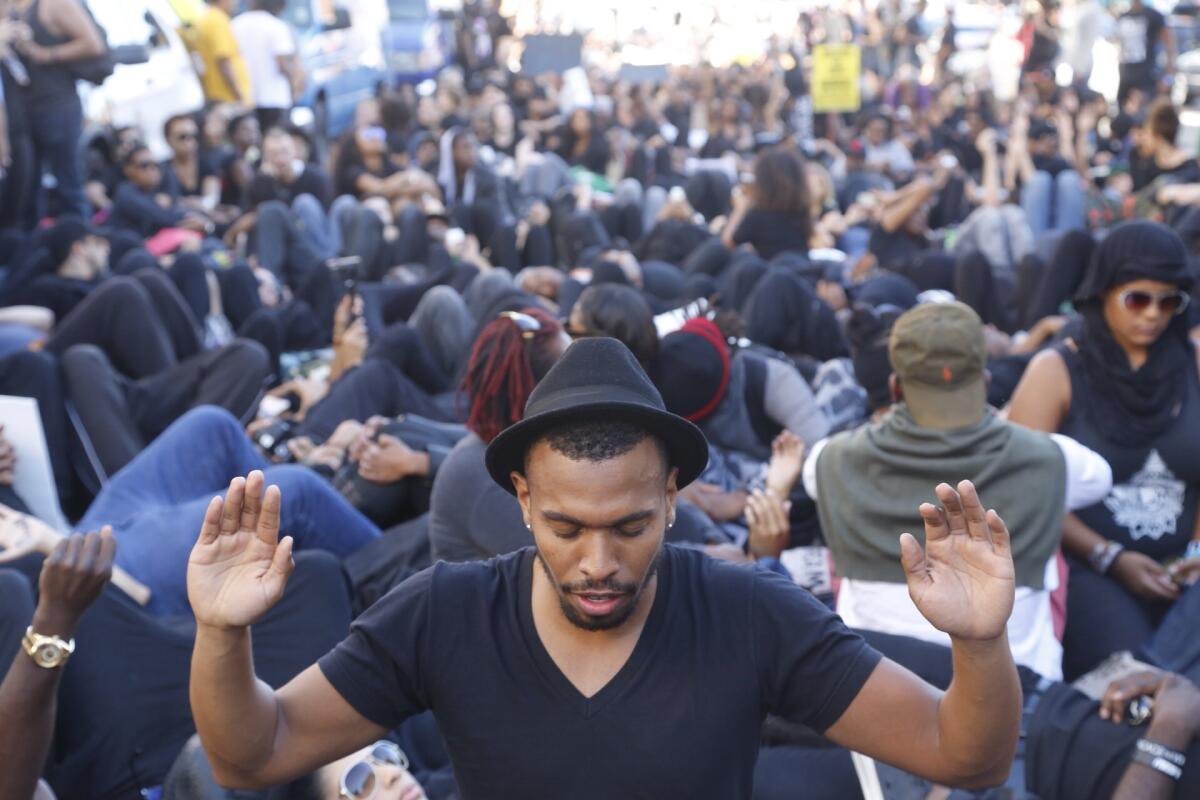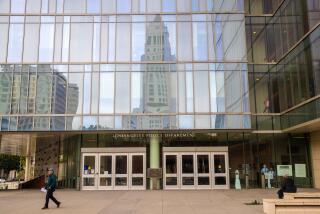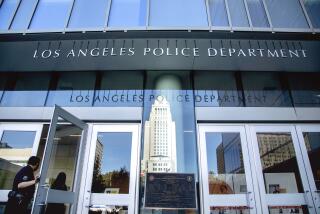California has some of the toughest laws keeping police discipline private. That seems unlikely to change

In the nearly three years since nationwide protests erupted after a Ferguson, Mo., police officer shot and killed teenager Michael Brown, state lawmakers introduced multiple bills designed to overhaul how much Californians are allowed to know about officer-involved shootings and internal investigations, and increase access to body camera videos.
But most of the major efforts have failed, and this year civil rights and pro-transparency groups have been unable to find a legislator willing to try to unwind some of the state’s strict protections against disclosing information about officer discipline.
The lack of legislation speaks to the substantial political influence of law enforcement within the Capitol and a waning sense of urgency on police accountability issues as some of the highest-profile examples of alleged misconduct fade from the headlines, advocates said.
“It may require unfortunately other incidents like those that gave rise to the Black Lives Matter movement for people to stand up and pick up that torch again,” said Jim Ewert, general counsel for the California Newspaper Publishers Assn. “The cops are going to be fighting this thing with both barrels blazing — no pun intended. Without that compelling story, it will be difficult, I think, for a legislator to go up against that very strong blue tide.”
California has some of the toughest laws in the country prohibiting the release of details about police misconduct, including instances where officers were found to have used excessive force. The laws are so stringent that a state appeals court this month temporarily blocked the Los Angeles County Sheriff’s Department from sending a list of deputies with histories of misconduct to prosecutors. Law enforcement groups have long argued that the protections are necessary to preserve officer safety and privacy.
But civil rights groups have contended the rules erode trust between community members and police.
Last year, former Sen. Mark Leno (D-San Francisco) introduced legislation that would have allowed the public disclosure of police records in cases where departments determined officers committed serious misconduct, such as lying or racial profiling. Leno touted polling from the bill’s principal backer, the American Civil Liberties Union, that said nearly 80% of Californians believed the public should have access to such cases. Leno’s bill, however, failed before receiving a vote on the Senate floor, amid furious opposition from police groups.
“Any criminal justice reform measure without any law enforcement association support is especially difficult for obvious reasons,” Leno said in an interview.
Leno cited his own efforts to end solitary confinement for juveniles as an example. For years, his bills aiming to ban the practice fell well short of passage. That changed in 2016 when the statewide organization representing probation officers signed on in support. The bill then received unanimous approval in the Legislature and was signed by Gov. Jerry Brown.
This year, the ACLU and other groups asked multiple lawmakers, including state Sen. Holly Mitchell (D-Los Angeles), to introduce a new version of Leno’s police discipline bill, but found no takers.
“People seemed to think it was an important issue and wanted to see the reform happen,” said Lizzie Buchen, legislative advocate at the ACLU of California’s Center for Advocacy & Policy. “But it would require someone receiving some wounds from law enforcement. I don’t fault anyone in the [Capitol] for not being willing to take it on.”
Mitchell, who has a history of writing criminal justice bills, said in a statement that as the Senate’s lead negotiator on the state budget, she had requests to write many pieces of legislation, “and had to make some tough decisions on what bills to carry.” Buchen said the ACLU was now focusing on trying to find a lawmaker to introduce a similar bill in 2018.
In the absence of legislation from civil rights groups, others are pushing changes to the discipline process with the backing of law enforcement. Assemblyman Evan Low (D-Campbell) is planning to introduce a bill based on a proposal drafted last year by the Peace Officers Research Assn. of California, which represents 69,000 rank-and-file officers in the state.
Low is still working out the bill’s details, but two key points will involve formally notifying those who make complaints against officers of the case’s status, and developing a mediation system to resolve disputes between residents and police officers. Low, whose brother is a Bay Area police officer, said it’s important for public safety groups to recognize community groups’ concerns about trust.
“You have to get your head out of the sand and you must participate in the process and try to understand fundamentally how we can increase the level of trust and access,” Low said he’s told law enforcement organizations.
Still, unlike Leno’s bill from last year, Low’s legislation won’t lead to the disclosure of any internal investigation results. Low said that approach went way too far.
“It would impede on law enforcement,” Low said.
For their part, law enforcement groups say they’re willing to accept body cameras and other tools implemented in response to national debates about police reform. They’re also pleased that lawmakers are receptive to their opposition to major changes in statewide officer discipline and body camera policies.
In the past two years, police unions have successfully fought attempts to prevent officers from viewing body camera footage before writing their reports following police-involved shootings and other serious incidents. The unions believe officers could otherwise be held liable for making innocent mistakes when recounting high-stress situations.
Alan Barcelona, who heads the 7,000-member California Statewide Law Enforcement Assn., said police groups remain steadfast on that and other officer discipline issues.
“I think the Legislature is becoming a little more educated about what we do on our side,” Barcelona said.
Twitter: @dillonliam
ALSO
Uncovering information about police misconduct might soon get easier in California
A court is blocking L.A. County sheriff from handing over a list of 300 problem deputies
Updates on California politics
More to Read
Get the L.A. Times Politics newsletter
Deeply reported insights into legislation, politics and policy from Sacramento, Washington and beyond. In your inbox three times per week.
You may occasionally receive promotional content from the Los Angeles Times.







